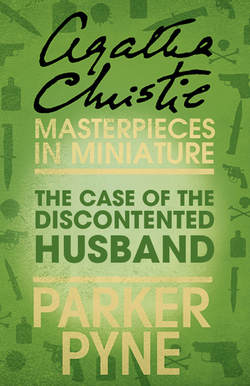Читать книгу The Case of the Discontented Husband: An Agatha Christie Short Story - Агата Кристи, Agatha Christie, Agatha Christie - Страница 5
The Case of the Discontented Husband
Оглавление‘The Case of the Discontented Husband’ was first published in the USA as ‘The Husband Who Wanted To Keep His Wife’ in Cosmopolitan, August 1932, and then as ‘His Lady’s Affair’ in Woman’s Pictorial, 29 October 1932.
Undoubtedly one of Mr Parker Pyne’s greatest assets was his sympathetic manner. It was a manner that invited confidence. He was well acquainted with the kind of paralysis that descended on clients as soon as they got inside his office. It was Mr Pyne’s task to pave the way for the necessary disclosures.
On this particular morning he sat facing a new client, a Mr Reginald Wade. Mr Wade, he deduced at once, was the inarticulate type. The type that finds it hard to put into words anything connected with the emotions.
He was a tall, broadly-built man with mild, pleasant blue eyes and a well-tanned complexion. He sat pulling absent-mindedly at a little moustache while he looked at Mr Parker Pyne with all the pathos of a dumb animal.
‘Saw your advertisement, you know,’ he jerked. ‘Thought I might as well come along. Rum sort of show, but you never know, what?’
Mr Parker Pyne interpreted these cryptic remarks correctly. ‘When things go badly, one is willing to take a chance,’ he suggested.
‘That’s it. That’s it, exactly. I’m willing to take a chance – any chance. Things are in a bad way with me, Mr Pyne. I don’t know what to do about it. Difficult, you know; damned difficult.’
‘That,’ said Mr Pyne, ‘is where I come in. I do know what to do! I am a specialist in every kind of human trouble.’
‘Oh, I say – bit of a tall order, that!’
‘Not really. Human troubles are easily classified into a few main heads. There is ill health. There is boredom. There are wives who are in trouble over their husbands. There are husbands’ – he paused – ‘who are in trouble over their wives.’
‘Matter of fact, you’ve hit it. You’ve hit it absolutely.’
‘Tell me about it,’ said Mr Pyne.
‘There’s nothing much to tell. My wife wants me to give her a divorce so that she can marry another chap.’
‘Very common indeed in these days. Now you, I gather, don’t see eye to eye with her in this business?’
‘I’m fond of her,’ said Mr Wade simply. ‘You see – well, I’m fond of her.’
A simple and somewhat tame statement, but if Mr Wade had said, ‘I adore her. I worship the ground she walks on. I would cut myself into little pieces for her,’ he could not have been more explicit to Mr Parker Pyne.
‘All the same, you know,’ went on Mr Wade, ‘what can I do? I mean, a fellow’s so helpless. If she prefers this other fellow – well, one’s got to play the game; stand aside and all that.’
‘The proposal is that she should divorce you?’
‘Of course. I couldn’t let her be dragged through the divorce court.’
Mr Pyne looked at him thoughtfully. ‘But you come to me? Why?’
The other laughed in a shamefaced manner. ‘I don’t know. You see, I’m not a clever chap. I can’t think of things. I thought you might – well, suggest something. I’ve got six months, you see. She agreed to that. If at the end of six months she is still of the same mind – well, then, I get out. I thought you might give me a hint or two. At present everything I do annoys her.
‘You see, Mr Pyne, what it comes to is this: I’m not a clever chap! I like knocking balls about. I like a round of golf and a good set of tennis. I’m no good at music and art and such things. My wife’s clever. She likes pictures and the opera and concerts, and naturally she gets bored with me. This other fellow – nasty, long-haired chap – he knows all about these things. He can talk about them. I can’t. In a way, I can understand a clever, beautiful woman getting fed up with an ass like me.’
Mr Parker Pyne groaned. ‘You have been married – how long? … Nine years? And I suppose you have adopted that attitude from the start. Wrong, my dear sir; disastrously wrong! Never adopt an apologetic attitude with a woman. She will take you at your own valuation – and you deserve it. You should have gloried in your athletic prowess. You should have spoken of art and music as “all that nonsense my wife likes”. You should have condoled with her on not being able to play games better. The humble spirit, my dear sir, is a wash-out in matrimony! No woman can be expected to stand up against it. No wonder your wife has been unable to last the course.’
